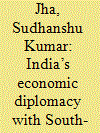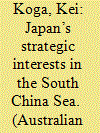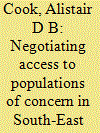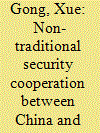|
|
|
Sort Order |
|
|
|
Items / Page
|
|
|
|
|
|
|
| Srl | Item |
| 1 |
ID:
151987


|
|
|
|
|
| Summary/Abstract |
Since the Asian financial crisis, the Association of Southeast Asian Nations (ASEAN) has sought to reorient itself towards becoming a ‘people-oriented’ association. Democratic transitions in the region and increased demands from civil society to be actively involved in regional governance have prompted ASEAN to develop forms of participatory regionalism. In practice, however, the rhetorical aspirations of ASEAN have not often matched the level of participation or support expected by civil society organisations. It has often been the case that ASEAN's decisions, especially those related to sensitive issues, have been influenced by external pressure as opposed to participatory mechanisms. The aim of this article is to determine to what extent participatory mechanisms impact ASEAN's approach to non-traditional security. By doing so, the authors combine two key elements central to a ‘people-oriented’ approach to regionalism: the incorporation of deliberative and participatory processes and the acknowledgement of transboundary security issues which require cooperation to move beyond state-centric approaches. This article explains that despite the rhetorical emphasis on participatory regionalism, it continues to be the case that regional civil society organisations and non-state actors have limited capacity to influence ASEAN. By providing a critical analysis of influences on ASEAN's non-traditional security policies, the authors offer a modest yet valuable contribution to the emerging literature on ASEAN's ‘people-oriented’ regionalism and advance a nuanced understanding of ASEAN's participatory mechanisms.
|
|
|
|
|
|
|
|
|
|
|
|
|
|
|
|
| 2 |
ID:
176243


|
|
|
|
|
| Summary/Abstract |
This article assesses how south-east Asian countries and the Association of Southeast Asian Nations (ASEAN) have responded to the ‘free and open Indo-Pacific’ (FOIP) strategies promoted by the United States and the other countries in the Quadrilateral Security Dialogue (the ‘Quad’: US, Japan, Australia and India). Their nuanced ripostes imply a persistent commitment to hedging and shifting limited alignments in the face of growing great rivalry and the lack of a clear FOIP vision among Quad members. In the face of external pressure to take sides, the ASEAN states are likely to keep hedging through working selectively with China and the United States. Given the United States' apparent preference to balance China and Trump's disregard for multilateralism, ASEAN's ability to maintain its centrality in the evolving regional architecture is in doubt—despite the Quad countries' (belated) accommodation of ASEAN in their FOIP strategies. However, the success of the US strategy depends on Washington's ability to build and sustain the requisite coalition to balance Beijing. ASEAN has undertaken efforts to enhance bilateral security collaboration with China and the United States respectively. In doing so, ASEAN is arguably seeking to informally redefine its centrality in an era of Great Power discord and its ramifications for multilateralism.
|
|
|
|
|
|
|
|
|
|
|
|
|
|
|
|
| 3 |
ID:
144019


|
|
|
|
|
| Summary/Abstract |
There is no gainsaying the fact that India is emerging as a leading economic power. Economy picks up pace and poverty continues to decrease. India grew 6.3 per cent per annum during 1988-2006 and has registered stupendous annual average of more than 7 per cent since 2006.
|
|
|
|
|
|
|
|
|
|
|
|
|
|
|
|
| 4 |
ID:
160370


|
|
|
|
|
| Summary/Abstract |
Japan has a national interest in the South China Sea issue. Although its direct commitment is ultimately limited in a material sense due to a lack of military capabilities, as well as political and constitutional constraints on the Self-Defense Force, Japan has maintained its firm stance to uphold international maritime rules and norms, and nurtured strong diplomatic relations and conducted maritime capacity-building programs with the South-East Asian states, as well as the Association of Southeast Asian Nations. These actions contribute to consolidating the rule of law at sea and provide those claimant states an opportunity to withstand pressures from China. Given the Trump administration’s unclear South China Sea policy and South-East Asia’s strategic uncertainty, Japan is becoming a key player in maintaining regional maritime stability in East Asia through diplomacy.
|
|
|
|
|
|
|
|
|
|
|
|
|
|
|
|
| 5 |
ID:
193378


|
|
|
|
|
| Summary/Abstract |
Mahabharata in Sanskrit literally means ‘the great India’. Mahabharata is not just an epic, a story or a historical incident, but a way of life and the basis of Indian spirituality since times immemorial. This paper is an attempt to discover the influence of Mahabharata on the South-East Asian countries.A nuanced attempt shall be made in this paper to assess and highlight the role of Mahabharata as an instrument of Soft power in Indian Foreign policy.
|
|
|
|
|
|
|
|
|
|
|
|
|
|
|
|
| 6 |
ID:
154863


|
|
|
|
|
| Summary/Abstract |
From 1946–1963, MI5 operated a South-East Asian regional headquarters in Singapore: Security Intelligence Far East (SIFE). This article responds to growing interest in theatre-level intelligence organisation and the importance of intelligence to Britain’s Cold War and decolonisation by examining the performance of SIFE. On the organisational level, SIFE was strongest when it remained wedded to its charter functions and closely adhered to the priorities of its principal consumer: the Commissioner-General for South-East Asia. Its assessments were influential in shaping decision-makers’ understandings of key regional developments, although this did not always translate into public policy. Lastly, SIFE enjoyed success in developing lasting liaison relationships to cement British influence, but failed to utilise these to improve its intake of raw intelligence.
|
|
|
|
|
|
|
|
|
|
|
|
|
|
|
|
| 7 |
ID:
158637


|
|
|
|
|
| Summary/Abstract |
South-East Asia is home to both conflict and ‘natural’ disasters which have caused significant displaced populations. Given this context, there is a need to better understand the motivations of the multiple actors involved in negotiating humanitarian responses, and to account for the impact the finished agreement has on the region both in the short and long terms. This article investigates the motivations behind two humanitarian responses in South-East Asia. The first case is the set of humanitarian responses to the Indochinese exodus in the 1970s and 1980s. The second case is the humanitarian response to those affected by Cyclone Nargis in Myanmar during the late 2000s and early 2010. Both of these agreements have been held up as historic and ground breaking achievements within the international relations of South-East Asia. This article assesses these agreements to identify the multiple levels of governance involved and the individual actors’ motivations behind them. It argues that greater appreciation of these dynamics will contribute to understanding the governance of humanitarian responses to populations of concern in South-East Asia. This will be important to consider as new crises emerge that demand new negotiations within a crowded field of actors governing humanitarian responses in the region.
|
|
|
|
|
|
|
|
|
|
|
|
|
|
|
|
| 8 |
ID:
176237


|
|
|
|
|
| Summary/Abstract |
The ‘free and open Indo-Pacific’ (FOIP) strategy, actively promoted by the United States with support from its allies and partners, is a significant geopolitical response to China's growing power and expanding influence in Asia and beyond. Beijing has adopted various new strategies to cope with the challenges related to FOIP. One of these strategies is to secure a robust relationship with south-east Asia in order to make these regional states either neutral to or less supportive of the Indo-Pacific vision. In addition to economic statecraft and soft power, Beijing believes that it can also tap into the domain of non-traditional security (NTS) to strengthen relations with this region to position itself better in the intensifying regional geopolitical competition. The article addresses the following question: what is the impact of China's NTS cooperation with south-east Asia on Beijing's geopolitical rivalry with other major powers in the Indo-Pacific region? The article argues that China's NTS cooperation with south-east Asian countries may help China maintain its geopolitical standing in the region, but it is unlikely to lead to any dramatic increase of China's strategic influence in the region. This essentially means that Beijing may be able to prevent ASEAN or most ASEAN member states from lending substantive and strong support to the Indo-Pacific construct, but it will not be able to stop ASEAN states from supporting some elements of the FOIP.
|
|
|
|
|
|
|
|
|
|
|
|
|
|
|
|
| 9 |
ID:
163488


|
|
|
|
|
| Summary/Abstract |
In the geopolitical region of South-East Asia, Pakistan lies at the intersection of big power rivalries and politics much more than Bangladesh. Thus, any development in Pakistan that will have an impact on the security and viability of that country will inevitably attract the attention of a number of external powers.
|
|
|
|
|
|
|
|
|
|
|
|
|
|
|
|
| 10 |
ID:
151992


|
|
|
|
|
| Summary/Abstract |
One of the biggest challenges for the East Asian region today is the Sino-Japanese relationship. Starting with the fishing trawler incident in September 2010, followed by Japan's nationalisation of the Senkaku/Diaoyu Islands, this relationship is experiencing an escalation of tensions in most, if not all, areas of the bilateral relationship. In response to the intensifying competition, China and Japan have elevated the importance of South-East Asia and the Association of Southeast Asian Nations (ASEAN) in their foreign policy strategies. Focusing on how elites from five South-East Asian states—Indonesia, Malaysia, the Philippines, Singapore and Vietnam—perceive the engagement of China and Japan with the region, this article poses two questions: (1) How do South-East Asian elites view the Sino-Japanese competition? and (2) How do South-East Asian elites view the role of ASEAN in managing the competition? The analysis here concludes that while some South-East Asian elites see opportunities in the Sino-Japanese competition, they nevertheless do not perceive it as an issue of critical significance. Instead, the concern lies generally with major-power dynamics, and particularly with Sino-US relations. ASEAN is viewed to lack the ability to manage the negative consequences of the Sino-Japanese competition, although its external balancing function has perceptibly helped to restrain any escalation of major-power tensions.
|
|
|
|
|
|
|
|
|
|
|
|
|
|
|
|
| 11 |
ID:
155073


|
|
|
|
|
| Summary/Abstract |
The increasing mobility of Japanese retirees to South-east Asia is part of a larger political economy reconfiguration in the region. This article argues that in order to fully appreciate the underlying dynamics of transnational retirement mobility, we should understand the mobility as processes of contestation over the seemingly simple question of ‘who is a retiree migrant?’. The governments of the destination countries and an emerging retirement industry strive to turn the retiree migrants into a particular type of high-value consumer subject. But the retirees see themselves as pragmatic individuals who seek to enjoy low living costs in South-east Asia in a time of economic uncertainty. The article sheds new light on transnational retirement mobility by examining how the retirees explore their sense of self while interacting with various actors. By linking it with the Foucauldian notion of subject making, this article deepens our understanding of identity negotiation in a transnational context.
|
|
|
|
|
|
|
|
|
|
|
|
|
|
|
|
| 12 |
ID:
188010


|
|
|
|
|
| Summary/Abstract |
Is there a link between levels of terrorism and the presence of organized crime groups? Which factors does terrorism affect that could impact the presence and expansion of organized crime groups? This study aims to empirically analyze this link. Dealing with potential endogeneity bias using matching methods, we provide quantitative evidence showing that terrorist attacks increase the future levels of organized crime group activities. Using Structural Equation Modeling techniques (SEM), we also show that the main mechanisms through which this relation seems to occur are through the effects of terrorism on state capacity and state legitimacy. Thus, organized crime groups seem to take advantage of the turbulent situation created by terrorist attacks in order to expand their activities. The findings provided in this paper aim to increase our knowledge on the so-called crime-terror nexus.
|
|
|
|
|
|
|
|
|
|
|
|
|
|
|
|
|
|
|
|
|